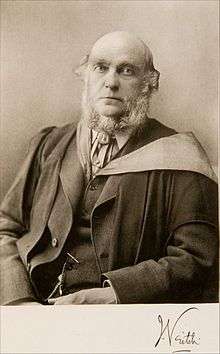John Veitch (poet)


John Veitch
John Veitch (October 24, 1829 – September 3, 1894), Scottish poet, philosopher, and historian, son of a Peninsular War veteran, was born at Peebles, and educated at Edinburgh University.[1]
He was assistant lecturer successively to Sir William Hamilton and Alexander Campbell Fraser (1856–60). In 1860 he was appointed to the chair of logic, metaphysics and rhetoric at St Andrews, and in 1864 to the corresponding chair at Glasgow.[1]
In philosophy an intuitionist, he dismissed the idealist arguments with some abruptness, and thereby lost much of the influence gained by the force of his personal character. He will be remembered chiefly for his work on Border literature and antiquities. See Memoir by his niece, Mary RL Bryce (1896).[1]
Publications
- translations of Descartes' Discours de la méthode (1850) and Méditationes (1852)
- an edition of Sir William Hamilton's lectures with memoir (1869, in collaboration with HL Mansel)
- Tweed, and other Poems (1875)
- The History and Poetry of the Scottish Border (1877; ed. 1893)
- Hamilton (1882)
- Institutes of Logic (1885)
- The Feeling for Nature in Scottish Poetry (1887)
- Knowing and Being (1889)
- Merlin (1889)
- Dualism and Monism (1895)
- Border Essays (1896).
References
- 1 2 3 John Veitch. University of Glasgow
External links
-
 Works written by or about John Veitch at Wikisource
Works written by or about John Veitch at Wikisource - Works by John Veitch at Project Gutenberg
- Works by or about John Veitch at Internet Archive
- Works by John Veitch at LibriVox (public domain audiobooks)

This article is issued from Wikipedia - version of the 3/14/2016. The text is available under the Creative Commons Attribution/Share Alike but additional terms may apply for the media files.